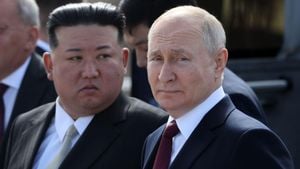The United Kingdom stands at a crossroads as the influence of the United States looms large over its post-Brexit trade relations. With Donald Trump returning to the political spotlight as he embarks on another presidential campaign, UK leaders face increasing pressure to navigate the treacherous waters of international trade—particularly the delicate balancing act between the US and the European Union.
Recently, Stephen Moore, a seasoned economic adviser to the former president, stirred the pot by delivering pointed advice to Sir Keir Starmer, the leader of the UK’s Labour Party. He remarked, "I’ve always said Britain has to decide—do you want to go toward the European socialist model or do you want to go toward the US free market?" The implication is clear: if the UK is aiming for favorable trading terms with the US, it must steer clear of aligning too closely with the EU.
Situations have shifted since the height of Trump’s presidency, where the UK was already grappling with tariffs ranging from 25% on spirits, affecting British gin exports, to uncertainty over food standards. The Trump administration’s tariffs were part of broader trade disputes aimed at protecting American industries, but they also sparked significant consequences for other nations, including Britain. Trade relations were strained by Trump’s inclination to use tariffs as leverage, complicates the prospects of straightforward negotiations with the UK.
The stakes are considerably high for Britain, with about £300 billion worth of trade with the US on the line annually, making it the largest trading partner for the UK. Much of this exchange involves services, including finance, business consultancy, and travel. Exports like high-value medicines, cars, and aircraft add to the strong trading rapport; still, uncertainties surrounding tariffs threaten to shake the foundation of these economic ties.
With Trump’s authoritative stance hinted by his recent comments, UK trade experts have begun to voice concerns about how his policies could manifest during another term. Analysts suggest the wait-and-see approach is unwarranted, especially with blueprints from Trump’s previous strategies. Under his leadership, tariffs could escalate to levels not witnessed since the Great Depression, resulting not only in inflation but also potential knock-on effects for global trade.
Moore's recent statements ushered grave warnings about the necessity for Britain to re-evaluate its position. His comments reflect broader fears of what might happen should the UK lean too heavily toward EU regulations. "Lately it seems like they are shifting more toward the European model, and if that's the case, I think we’d be less interested in having [a free trade deal]," he cautioned.
Labour Chancellor Rachel Reeves is quick to counteract such messages from Trump’s camp. She has emphasized the importance of safeguarding UK agricultural standards, assuring British farmers, "We are not going to allow British farmers to be undercut by different rules and regulations from other countries." This statement underlines the cautious optimism shared by some UK leaders who hope to forge closer ties with the EU, all the more pressing as the economic outlook softens with reports of stagnation within the UK economy.
Despite these glimmers of optimism, the UK economy has seen its share of struggles, with experts noting potential GDP growth could be halved if the US imposed tariffs without any trade deal. This realistic scenario, coupled with Moore's warnings, suggests the need for UK policymakers to tread carefully. The National Institute of Economic and Social Research has underscored how the size of the potential economic impact leaves little room for missteps.
Looking back at Trump's previous presidency provides both lessons and warnings. During Trump’s first term, trade between the US and UK recorded some surprising growth, rising even amid turmoil, largely due to British exporters adapting quickly to market demands—even carriers of goods took measures to dodge tariffs. The hope is some of this innovation continues as the UK faces potential surges due to tariffs. Yet, one cannot ignore the growing divide Trump has cultivated toward countries where trade deficits exist, which could include the UK once more.
Experts speculate on how imminent disruptions could manifest, especially with inflation already troubling consumers. While the potential for relief might exist through possible cheaper imports, UK businesses might struggle, fundamentally altering the domestic market. The response to Trump's aggressive stance will depend on expertise and the UK’s overall adaptability to change when trade negotiations inevitably shift.
Now, amid these changing tides, questions arise about whether Starmer’s Labour Party will shift its approach under the pressure of international economics. The leader aims to mend relations with the EU, which makes for uneasy and complicated negotiations—with any existing arrangements coming under scrutiny.
Some analysts assert aligning with the EU could afford the UK additional security against pressures from the US. During his previous presidency, Trump subjected UK leaders to proposals considered extreme—such as watering down food safety standards. Even still, Starmer is vocal about seeking to "reset" UK-EU relations, aiming for agreements to ease trade tensions. While such actions seem to move the UK closer to Europe, they also heighten risks of being overlooked by American counterparts.
The delicate line Starmer intends to walk presents intriguing and contentious scenarios for trade policy. Despite the Labour leader’s inclination toward EU relations, his commitments to openness must align with the urgencies posed by US negotiations. There is the tacit recognition among political experts, especially trade officials, about how the UK holds diminished bargaining power dealing with the range of Trump-clamped demands, compared to when it was part of the EU.
All this points to the complexity of the post-Brexit trade environment where decisions taken have not just economic repercussions but strategic geopolitical ones too. The consensus leans toward settling uncertainty with wise diplomatic balancing, though with Trump returning to significant influence, such hopes could be challenged more than ever.
Perfecting the art of negotiation with the US and the EU becomes, then, not just about aligning trade principles, but also about balancing the expectations of British farmers, consumers, and producers. Each step not taken or misstep could reverberate through the markets, exerting powerful influences on everyday life of UK citizens far and wide.



